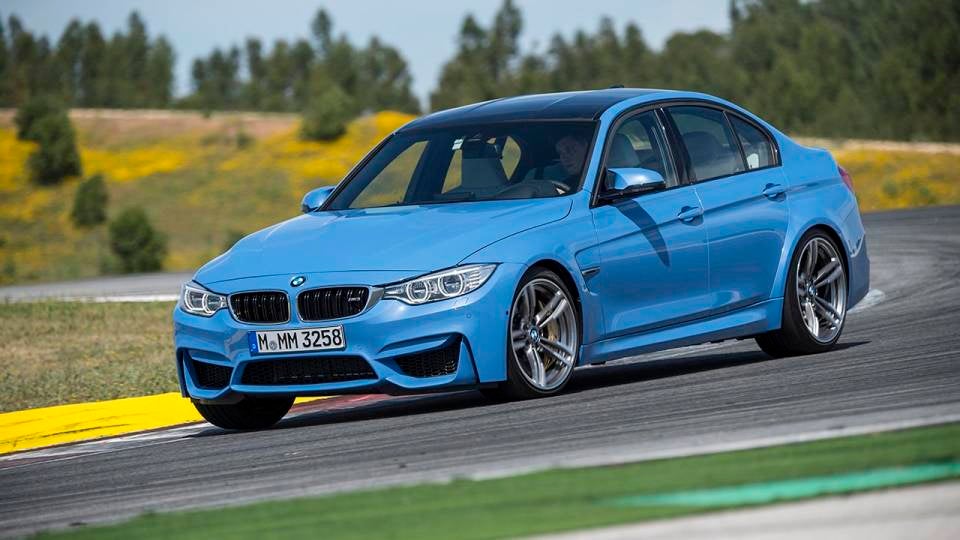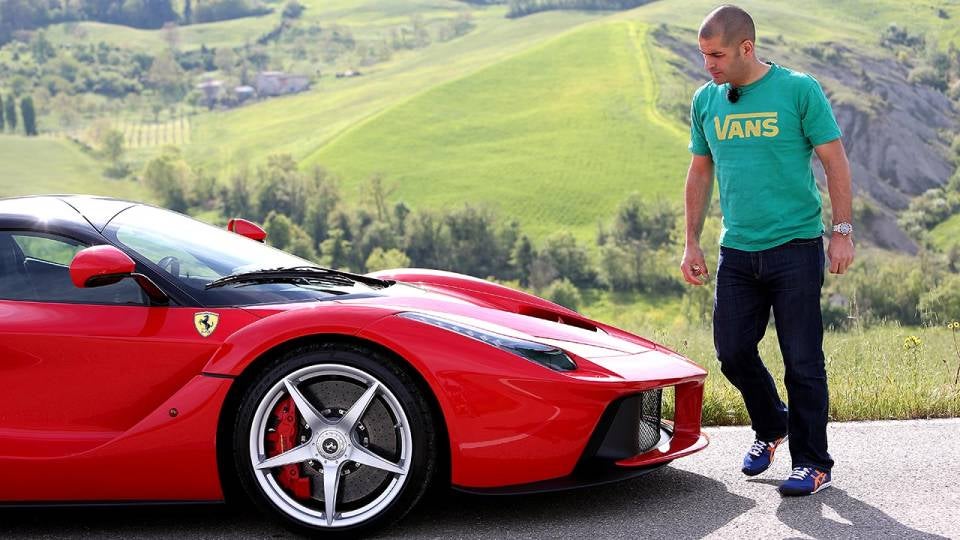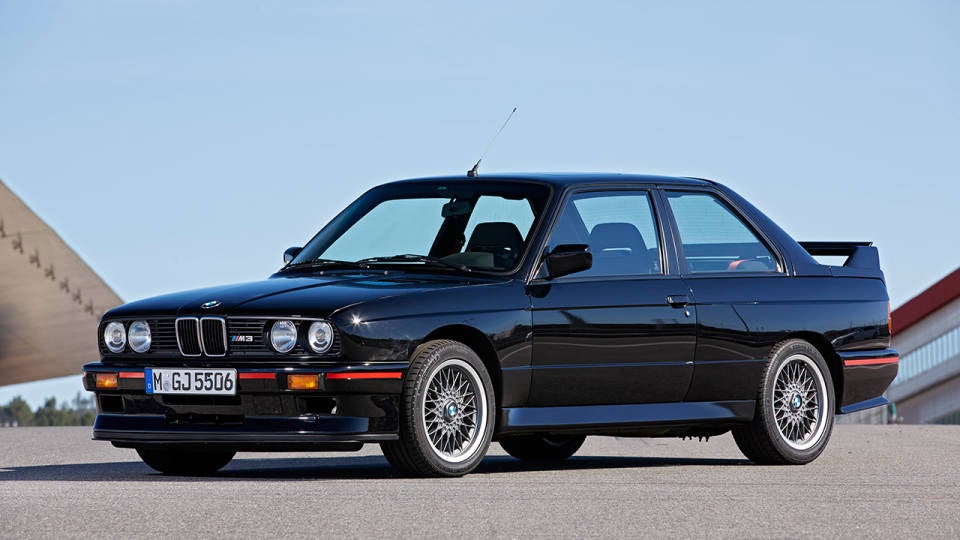 "mr_gofast" (jake_berenshteyn)
"mr_gofast" (jake_berenshteyn)
08/15/2014 at 12:20 • Filed to: CHRISHARRIS
 3
3
 21
21
 "mr_gofast" (jake_berenshteyn)
"mr_gofast" (jake_berenshteyn)
08/15/2014 at 12:20 • Filed to: CHRISHARRIS |  3 3
|  21 21 |
I recently turned to the dark side to endure some motorcycle training. I have no interest in an insane sports bike and made a point of asking the instructor what he'd recommend. He said that a U.K. motorcycle magazine had once conducted a test, using rider feedback, to define the ideal amount of power for the road, and the result was 36 hp.
Thirty-six horsepower.
So what's the ideal power for a normal road car, given the same considerations? The media launch event for the new F80 M3 brought this into focus, because BMW had all of the older variants on display. This allowed journalists to stroll past them and tsk at how the new car was too big and too potent, and declare that the old machines offered better "feel," neatly avoiding the fact the 3.0-liter E36 M3's steering was more vague than a drunken breakup. And that an M135i would spank its lovely Dakar Yellow arse.

BMW
RELATED: !!!error: Indecipherable SUB-paragraph formatting!!!
!!! UNKNOWN CONTENT TYPE !!!
This is the power of hindsight, whose irksome presence looms over all human endeavor, especially during times of change. But potentially the most irritating hindsight-infected corollary of ever-faster cars is the notion that what constitutes "enough" is best represented by what came before. It's an opinion that dovetails neatly with handwringers who believe cars are now too fast.
To which I reply, "Oh, bugger off."
I recently set out to test that theory, and also to define, using that most sensitive measuring apparatus—my posterior—exactly what is the ideal level of performance for a fast road car.
For me, one of the key distinctions of performance is the percentage of throttle that can be used sensibly on the street. And this is why, despite being a committed hedonist, I have to admit that anything bearing a hypercar badge is just too much; in the McLaren P1, LaFerrari, and Porsche 918, you never get the chance to push that pedal to the floor and hold it there. This is a critical aspect of road driving. I need to occasionally smash my right foot into the bulkhead. I believe going flat-out is a primal need. Much as delicately metering out 950 hp is a pleasant lesson in restraint, eventually you just need to give it the beans. And then probably crash. You won't crash in a 991 Turbo, but you will end up incarcerated, leaving us with the feeling that those who advocate the ideology of thrashing a cheap rental because it can be driven without lifting may have a point.

Ferrari
RELATED: !!!error: Indecipherable SUB-paragraph formatting!!!
!!! UNKNOWN CONTENT TYPE !!!
Other factors need to be considered. This isn't just a matter of power and weight. Traction is key. On one hand, power means nothing if it cannot be distributed to the road surface, so four driven wheels should allow twice the engine power. Is that twice the fun? On the other hand, shouldn't we want the car to move around a little? Maybe have a little too much power? I once fitted four space-saver spare tires to a C63 AMG. The result was exciting but antisocially sideways.
And what about size? It's not such a problem for Americans, but here in the U.K., my Ferrari FF (I say that casually, but it feels a touch disgusting) is far too wide. On country roads, something smaller and threadable would be faster and probably more fun. Come to think of it, I could save myself a mint on finance payments if I considered that.

BMW
RELATED: !!!error: Indecipherable SUB-paragraph formatting!!!
!!! UNKNOWN CONTENT TYPE !!!
The investigation then turned to the BMW E30 M3, because it is said that all motoring conundrums can be answered by the masterpiece from Garching. It has the steering, the chassis, the hearts of the retro-bullsh** committee, and, according to the sneering voices at the new M3's launch, "it's all the performance car you could ever want." Well, so long as you don't want to travel especially quickly. The car on hand was a 2.5-liter Sport Evolution no less—235 hp and 2650 pounds—and for all its balance and guile, it felt only acceptably quick. As in not fast enough. A 335i would dust it. Gorgeous it may be, but the E30 ain't quick enough to rock 2014.
Interim results now suggest street utopia is the following: more than 250 hp but less than 950, four-wheel drive for that all-weather kidney squeeze but rear-drive if you want to slither. And perhaps torque is preferable? It's the twisting force that pings you from turns and creates usable performance.
Take the new Golf R. Surely this machine deserves new nomenclature, given its sparkling talent in the face of shoddy ancestry. It might also provide the answer to the how-much question. Over here, we get six horsepower more than your R's 290, and the thing just flies. It grips, it makes growly noises, and after two days behind the wheel, my backside felt like it might have located the magic number. Only the car's Haldex four-wheel-drive is too sensible, and the car never pins you into the seat. We all need to be pinned occasionally.
What the old guard failed to realize at the new M3 launch is that our expectations change over time. And strangely, for me, over the past 30 years, it has always been the M3 that defines how much is enough.
In 1990, it was 235 hp; in 2001, it was 333. Today it is 425 hp of twin-turbo six. A little more than 36 horses. And tomorrow it will probably be more.
!!! UNKNOWN CONTENT TYPE !!!
 505Turbeaux
> mr_gofast
505Turbeaux
> mr_gofast
08/15/2014 at 12:22 |
|
36hp beetles always felt right to me as well. Not fast, but enough. Sort of motorcyclish also...

 mr_gofast
> 505Turbeaux
mr_gofast
> 505Turbeaux
08/15/2014 at 12:33 |
|
how much did a 36hp beetle weigh though...cars have gotten fatter for the most part...unless theyre sprots cars where its the opposites.
 505Turbeaux
> mr_gofast
505Turbeaux
> mr_gofast
08/15/2014 at 12:35 |
|
oh much fatter. I dont even think a 36hp beetle cracked 1800 lbs
 mr_gofast
> 505Turbeaux
mr_gofast
> 505Turbeaux
08/15/2014 at 12:39 |
|
then how much hp is too much has to be scrutinized along with the weight of the cars - you cant have 120hp in a full size pickup or 59hp in a 4 door sedan
 mcseanerson
> mr_gofast
mcseanerson
> mr_gofast
08/15/2014 at 12:45 |
|
I believe the ideal setup is a light car under 3000 lbs with less than 200hp. The more horsepower the less time you get to play with the throttle. I can't decide whether I would like a Fiesta Ecoboost or ST better.
 mcseanerson
> mr_gofast
mcseanerson
> mr_gofast
08/15/2014 at 12:47 |
|
Yes this is very true. I feel almost as though my 1.8 Miata has too much power. I get to floor it on onramps and a few other situations but not as often as I'd like. My Ford Aspire was redlined everywhere.
 mr_gofast
> mcseanerson
mr_gofast
> mcseanerson
08/15/2014 at 12:51 |
|
redlining a miata is wrong how?
 Chteelers
> mr_gofast
Chteelers
> mr_gofast
08/15/2014 at 12:53 |
|
HP is nothing. Torque/weight is the only acceptable measure of a car's ability to accelerate. F=MA... Newton FTMFW
 nermal
> mr_gofast
nermal
> mr_gofast
08/15/2014 at 13:10 |
|
The answer to this question is easy, and you were close - The ideal HP for a road car is however much the current GTI has.
The ideal HP for a track car (driven for fun at track days) is enough to be fun, but not too much. When you get bored on straights, that's not fun and you need more. When you can't exit a corner without going sideways and almost crashing, you have too much, and need to dial it back a bit.
The ideal HP for a race car is simply more. The point of racing is pushing the limits, lowering lap times, and being faster than everybody else. Thus, the only logical answer to how much HP you need is "more".
 mcseanerson
> mr_gofast
mcseanerson
> mr_gofast
08/15/2014 at 13:17 |
|
It's the fact I only get to do it in a straight line. I could redline the Aspire in a roundabout and not upset Johnnie Law.
 Supercharged-V8-Jag
> mr_gofast
Supercharged-V8-Jag
> mr_gofast
08/15/2014 at 13:20 |
|
You can never have too much HP; that isn't the problem. The problem is how that horsepower and torque is applied.
 Shankems
> mr_gofast
Shankems
> mr_gofast
08/15/2014 at 13:21 |
|
9-10 lbs/HP at the crank is a sweet spot.
 mr_gofast
> nermal
mr_gofast
> nermal
08/15/2014 at 13:23 |
|
is hp more important or is weight....that changes everything...
 nermal
> mr_gofast
nermal
> mr_gofast
08/15/2014 at 13:54 |
|
I'd say that in almost all cases, balance is the most important. As you add power, you also need to add traction, cornering ability, and brakes to keep up.
 Bluecold
> Chteelers
Bluecold
> Chteelers
08/15/2014 at 17:54 |
|
Okay, let me explain this to you, in less than two lines:
Accelerating a car means adding kinetic energy to the car over a period of time. This energy comes from the engine. Energy over time is power.
 Chteelers
> Bluecold
Chteelers
> Bluecold
08/18/2014 at 08:45 |
|
Acceleration equals force (torque) over mass (pounds). It's basic physics yo.
 Bluecold
> Chteelers
Bluecold
> Chteelers
08/18/2014 at 09:10 |
|
Please try to think instead of just regurgitating. You're not thinking. Or you're just not good at it. Try to find the flaw in my logic. I won't bother to explain where you're wrong except pointing out that crank torque is not equal to wheel torque and leave it at that before you're going to try and smother me with gear ratio and 'leverage' talk you don't half understand. I've been in that discussion before.
 Chteelers
> Bluecold
Chteelers
> Bluecold
08/18/2014 at 09:47 |
|
You're entitled to your opinion. But you're arguing against math. Good luck.
Acceleration is produced by a force acting on a mass. Power is not in this equation. Power is the rate of force applied, which is useful to calculate various thermodynamic measures, but has nothing to do with acceleration. For example, what is the acceleration of a car with 1000 hp?
That question is unsolvable without knowing the mass of the car and the engine torque. Which is why I said that only torque / mass is relevant for acceleration.
 Bluecold
> Chteelers
Bluecold
> Chteelers
08/18/2014 at 09:56 |
|
See, you're regurgitating without reading my reasoning (it's physics, not math by the way)
In any case, returning to your question of a 1000 hp engine with a car of unknown weight:
After 1 second of accelerating (assuming a flat power curve over the 1 second of acceleration, that the car can put all the power down, neglecting drag and neglecting the rotational energy in all the rotating parts), the car will have a kinetic energy of 746kJ. Kinetic energy is 0.5m*V^2. After 1 second, the car will have experienced a delta V of 38.6/sqrt(m) meters per second.
No torque needed.
 Chteelers
> Bluecold
Chteelers
> Bluecold
08/18/2014 at 10:13 |
|
Whatever dude. That's a pretty tortured representation of acceleration. Are you suggesting a 1000hp car will accelerate to 38.6 m/s after 1 second, regardless if it weighs 100 lbs or 1 million pounds? I can assure you it will not.
It's a pretty basic calculation. Accel = Force/Mass. Period. I have every physics book ever on my side.
 Bluecold
> Chteelers
Bluecold
> Chteelers
08/18/2014 at 10:21 |
|
Again, you are not reading. Please try.
38.6 DIVIDED BY THE ROOT OF IT'S MASS. meters per second.
Also, gearbox. With a gearbox you can multiply torque, but not power.